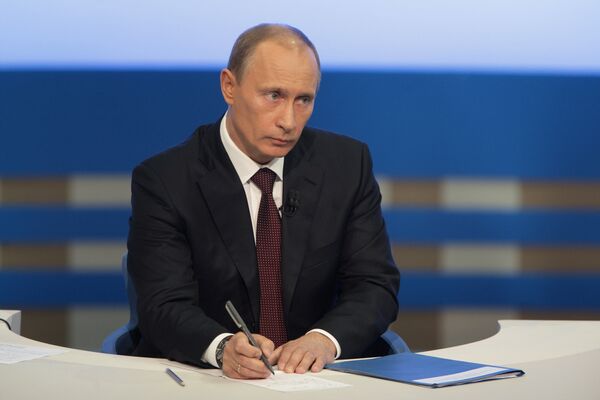Prime Minister Vladimir Putin fielded a wide range of questions from the Russian public during his live TV and radio phone-in on Thursday afternoon.
During his time as president, Putin held six live phone-ins.
Today's session was held in Gostiny Dvor, an exhibition center in downtown Moscow used as the venue of United Russia party congresses. Putin answered more than 90 questions in 4 hours and 2 minutes, beating his previous record of 3 hours and 8 minutes.
Russians were able to submit questions by phone, online, and via text message. A large share of the questions reflected concerns over social problems.
Putin's main points:
Domestic issues:
- The Russian Armed Forces must keep up with modern challenges to reliably ensure national security
- Russia will continue to rely on its own defense industry to develop and produce new weaponry
- Much has been done to defeat terrorism in Russia, but the threat has not been eliminated
- It is necessary "to act in a tough way" against the terrorists responsible for the recent attack on the Nevsky Express train
- Police crime must be dealt with relentlessly, but there should be no discrediting of the force
Economic issues:
- The worst of the economic crisis is now over
- Inflation in Russia could be under 9% this year
- Russia's GDP will decline 8.5-8.7% and industrial output 13% in 2009
- Despite the crisis, growth in Russia's agriculture sector this year will be 0.5%
- Russia's economy has managed to avoid grave consequences from the current global economic crisis, unlike after the 1998 financial meltdown
- The Russian aircraft industry is facing a bright future
- A new Lada car based on a new platform must be developed by Avtovaz
- Russian steelmakers will cope with the problems caused by the crisis, and will boost production in the post-crisis period
- New power producers should honor commitments on investment in the expansion and modernization of generating facilities
- The situation in Russia's light industry has improved since the Cherkizovo market was closed in Moscow
- Russia wants to increase support for the agricultural sector by joining the WTO
- The legacy of the Soviet planned economy and expectations that the government will solve all problems hamper Russia's development
- The government will allocate 18 billion rubles ($620 million) to the Amur shipyard in the Russian Far East
Personal issues:
- He has no plans to quit politics
- He has good relations with Russian President Dmitry Medvedev
- He has yet to decide whether to run for president in 2012
- He does not consider himself a "great" person and does not suffer from depression
Social problems:
- The Birth rate in Russia will grow by over 3% in 2009
- Prices on medicines will stabilize in 2010 when new legislation comes into force
- The Russian government will spend 10 billion rubles ($341.45 mln) to buy used cars
- Russian authorities will continue reducing the number of officials in the country
- Ministers and other officials will make more trips across Russia and visit companies more frequently
- The introduction of a state monopoly on alcohol production and sale would not solve all problems facing the sector
- The Russian government will spend 250 billion rubles ($8.6 billion) to cut mortgage rates to 10%-11% in 2010
- The Russian government is considering giving more authority to the industrial safety regulator, Rostekhnadzor, in efforts to prevent accidents similar to the August 17 disaster at a Siberian hydropower plant that killed 75 people
Foreign affairs:
- He does not back Ukrainian Prime Minister Yulia Tymoshenko's presidential bid
- Wishing ill to other countries, including the U.S., is pointless
Environmental issues:
- Putin pledged to help the conservation of endangered polar bears
- Russian wildlife experts are trying to revive the population of Caucasian leopards, and some have been sent to Russia from the former Soviet republic of Turkmenistan
MOSCOW, December 3 (RIA Novosti)




